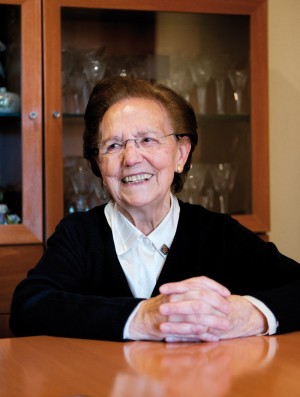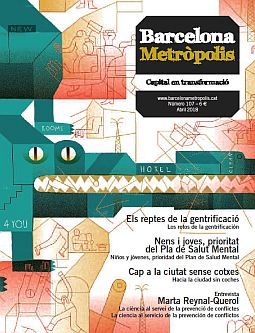Born in Madrid 83 years ago, she arrived in Barcelona during the Spanish Civil War. She promoted the first Association of Family Members of the Mentally Ill of Catalonia, and she later founded the Mentally Ill of Catalonia Foundation, which recently celebrated its 25th anniversary. In 2000, she was awarded the Creu de Sant Jordi for her fight to defend those affected by mental illness which, in her words, “isn’t an issue of yours or mine, it’s everyone’s. It can affect anyone.” In this article, she tells us about her experiences.

Silvestra Moreno, interviewed for this report, who has dedicated much of her life to the defence of the mentally ill.
Photo: Arianna Giménez
“When I got married and had children, I took care of both them and my in-laws, as was normal at the time. One day, my father-in-law –who must have been about 80– started to suffer from senile dementia. He turned aggressive. He thought the neighbours wanted to rob him, that they had broken into his house, and things like that. He reacted violently, so much so that the neighbours were afraid he would hurt them one day. They told me either I got help or they would call the police.
And that’s how it all started. It was 1980. I brought my father-in-law in, and when the doctor saw him, he wouldn’t let me take him home again. They transferred him permanently to the Mental Institute of La Santa Creu i Sant Pau. ‘So, what do I do now?’ I asked. ‘You? Nothing, you’re all set’, they answered. ‘Listen’ I said, ‘I didn’t bring you a package, this is a person. He’s my husband’s father and my children’s grandfather.’ Until he died, I went to see him twice a day.
But the Institute looked abandoned. It was understaffed, and the sick interns weren’t getting the attention they needed. Just a few years before, the administration had begun to close down mental institutions and to return the ill to their homes. People who had been at the institution for 20, 30 years! It was a disaster. They couldn’t get used to it, and neither could the families. And other patients were all alone, without resources. Where could they go?
There at the Institute, I would always talk to the young patients, and most of all I would listen to them. They would say to me ‘I have four children. If one day one of them got sick and I had to bring them here, it would kill me. This place is awful.’ Because of that and because of my father-in-law, I began to get involved. With the support of some professionals, we, the family members, started to timidly make complaints, to protest. Finally, in 1986, I created the Association of Family Members of the Mentally Ill.
As the president of the organization, I was in the know about everything: the patients that died, the ones that were transferred, the ones that were sent home. I was always going to the courts with documents, because only a doctor can take away the right to freedom of an advanced Alzheimer’s patient or someone with dementia, and have them turned over to a mental institution. The public prosecutor recognized what I was doing, and they suggested that the Association take responsibility for the ill who didn’t have families. So, we did. We ended up taking care of 400.
After six years, we decided to go professional. We created the Foundation for the Mentally Ill of Catalonia, which just celebrated its 25th anniversary. With this association, we basically played the role of the family for the ill. We made sure that no one made decisions about them without taking them into account, either them or their families. We would go and see them and we would show them warmth; we wanted them to know that they weren’t alone and, if they needed anything, we at the Foundation would help them with everything we could. Then, we were given power, something we’re unfortunately missing now. People would listen to us. We organized the second European Congress of Associations of Families of People with Mental Illness. I even ended up as the president of the Spanish Confederation of Groups of Families and Individuals with Mental Illness.
25 years of the Foundation already… I never thought we’d make it this far. I guess it gave me strength to know that mental illness isn’t yours or mine, it can be anyone’s. It’s true that, thanks to our efforts, things have changed a little. At least now we can be sure that people are cared for. When we started out with the Association and the Foundation, there were sick people who only got to see the psychiatrist once a year!
What hasn’t changed much is the stigma. Plus, now there are trends that do a lot of damage. Like saying ‘I’m depressed.’ If you only knew what a real depression is like! The worst part of a mental illness is that the victim themselves isn’t aware that they’re ill, and that means that there’s always a war on in their house. Poor families! Empathy is key. I’ve even spoken with a mentally ill person and her two imaginary friends over the phone to get her to go and see a doctor. Looking back, I remember the faces of many people who were lost and who we found again. We helped them. And that makes me feel good.”




La Silvestra ha estat una lluitadora extraordinària. Sense fer soroll, discretament ha aconseguit que tothom: administració, polítics, societats científiques, professionals de la Psiquiatria, pacients i familiars entenguessin com d’important es lluitar contra l’estigma i el patiment de la persona afectada d’un problema de salut mental. Avui encara presidint la Fundació Tutelar MM de Catalunya segueix donant testimoni.
Gràcies Silvestra